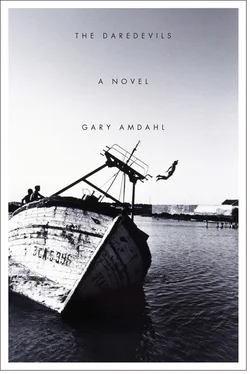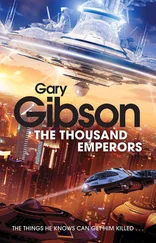“Excuse me,” said the man, his face suddenly, without Charles having noticed the movement, very close to his own, smiling. “Are you one of Winter’s people?” He looked and acted like an overzealous salesman.
“You betcha,” said Charles. “I am a man for all seasons.”
The man cocked his head stupidly, and Charles crossed himself for no apparent reason. Then he nodded as if with unction. The man stepped back and looked at Charles, as if not terribly amused but willing to play along. Charles crossed himself again, with a hint of truculence, and nodded. Then he said he knew John Winter. He knew him better than the man knew his own daddy.
“All right,” said the man. “Stay here and listen to what she says and then—”
“Don’t tell me how to do my job, bud,” Charles interrupted him.
“Where’s your notebook, sport?” the man demanded in an angry whisper that caused spittle to form. “I’m going to get the sheriff. I’ve already got some folks lined up to press charges.”
Charles had his little black notebook out and was flapping its cardboard covers at the man’s face like a yapping mouth. “You do that.”
When the man went out the door, Daisy came in. She looked long and hard at Charles and Vera as she walked past them. She made her way to the front of the hall, mounted the platform, and moved behind the podium. After a moment, the quack and whine of voices settled, and she began her speech. She got through the “double profits” section and started in on the war. She mentioned the newspaper report dealing with the forced impregnation of German women, then repeated her belief that American women would never let themselves be used as brood sows for future wars, at which point three men and three women left their seats and departed the hall. The men at the back began to boo and heckle her. She continued to speak without seeming to notice, as the action seemed rather perfunctory, rehearsed as things are rehearsed in the early days of rehearsal — not menacing or even intrusive. When she was done and the audience was making for the doors, the sheriff and several deputies walked in, bowling people out of the way until they got to Daisy, who paled and stepped back. People still in the hall stopped in their tracks, and a few outside came back to crowd the doorway.
“What is the charge?” asked Daisy weakly.
“Sedition, you stupid cunt,” said the sheriff irritatedly. “Get with the program.”
He tugged on her arm so violently that she lost her balance and would have fallen to the floor had the sheriff not been holding on to her, carrying her along like one would a stumbling toddler.
Marched past Charles and Vera, she appeared to pull herself together and again looked straight and meaningfully — or was it imploringly? — at them.
Charles’s knees and bladder immediately weakened. His face began to burn and his vision to blacken around the edges. Had he gotten himself into something, mainly because he could? I am an anarchist. I am a daredevil. You see? Excellent. Where is everybody going? I haven’t even—
Then it got worse. He felt as if something long and sharp had punctured his stomach and was being driven upward through his lungs to his heart, which was about to explode. He felt as if this great incorporeal spear were hoisting him off his feet. Dancing a strange little dance to keep his balance, he felt absolutely certain that his new role was to draw a weapon and rescue Daisy, to warn the servants of evil back back back, and then to run off into the night and never be seen or heard from again.
It was the heroic act that would link the lost past and the uncertain future, a great surge of blood in a flash of light that would reveal the great world, the good world, but which could only last seconds.
And indeed by the time he reached the door, Daisy and her captors could no longer be seen, and he was blinking and swallowing in confusion and darkness — feeling not shame but something more absurd, like regret.
“We should get the hell out of here,” said Charles.
“Yes,” said Vera. “No.”
“We should let what’s his name bail her out.”
“Who?”
“Whoever runs the NPL.”
“Townley.”
“Townley. Where is Townley.”
“Good question.”
“Why have I never met Townley.”
“He probably knows more about you than you know about yourself and decided he doesn’t want to meet you. I mean, in person, rather than in his head.”
“We should let this son of a bitch Townley get Daisy out of jail and we should go to the south of France. Or we could go to a Greek island, one of the Cyclades. Or Skyros, rather, one of the Sporades, north Aegean. We could go to the Levant, to Alexandria, the real one, in Egypt. I think you’d like Alexandria, Vera. You speak five languages in the course of a short conversation on a street corner. Money and words feverishly exchanged night and day. Easier access to better drugs. Beirut, Smyrna. Or we could go to Japan, as Father counseled in the wake of the Russo-Japanese War. Would you like to go to Japan, my darling? Study Zen and the Tao?”
“But we have. ”
“We have what?”
“Don’t we.?”
“Don’t we what?”
“Have a duty to stay here and see this through?”
“DUTY!”
“Yes. Don’t we?”
“Did you say ‘duty’?”
“Yes.”
“No. We have no duty whatsoever.”
“We do.”
“Yes, all right: we do, but we won’t know what it was until after it’s over and done.”
“We have a duty to see that the show goes on.”
“The script may very well call for our exit stage left. It could call for that as easily and surely as anything else.”
“No, because. because here. ”
“Here what.”
“Here is where we are.”
“We do not have to stay here.”
“This is the stage. We can go offstage but offstage is still the stage.”
But then Winter’s man had come back, and Charles had him by the arm and wouldn’t let go, no matter how hard the man shook and how loud he yelled. Charles was speaking, but he could not make himself out. He was simply bellowing incoherently, as if in pain.
Vera separated them. “Something,” Charles said breathlessly, “is a little fucked up here. Wires get crossed or something?”
“What the fuck are you talking about?” the man panted and fumed.
“Somebody, ummm, tell you expressly to have her arrested ?”
The man laughed brutally. “Yeah, that’s right, somebody did!”
Charles appeared to become angry. Strangely, he wasn’t. “Well, somebody told me expressly not to .”
“TALK TO WINTER!”
“I TALK TO MCGEE!”
“YOU DON’T TALK TO MCGEE!”
“I SURE AS HELL DO!”
“IF YOU TALKED TO MCGEE YOU’D KNOW TO BE TALKING TO WINTER AND NOT MCGEE!”
“I TALK TO MCGEE AND I KNOW NOT TO BE TALKING TO WINTER!”
The man kept smiling and shook his head, a combination of gestures Charles had always found, for some reason, irritating and provocative. He could no longer say if he was angry or not: things were changing too quickly. He stepped forward too quickly, brought his head in too close to the other man’s, and actually tapped his forehead with his own.
“There is a plot ,” Charles cried, “she is part of a plot to do something, we don’t know what yet, throw a bomb or shoot someone, as part of, as part of a plot, I mean a demonstration connected to the streetcar strike in Minneapolis and Saint Paul.”
There was a flare of wild hatred in the man’s eyes. “Don’t ever do that to me again,” he said, foaming.
Charles bugged his own eyes out and darted his head forward, coming perilously close again to the man’s forehead. “WATCH HOW YOU FUCKING LOOK AT ME THEN!” He felt entirely committed to the role: as if he had jumped off a cliff.
Читать дальше












